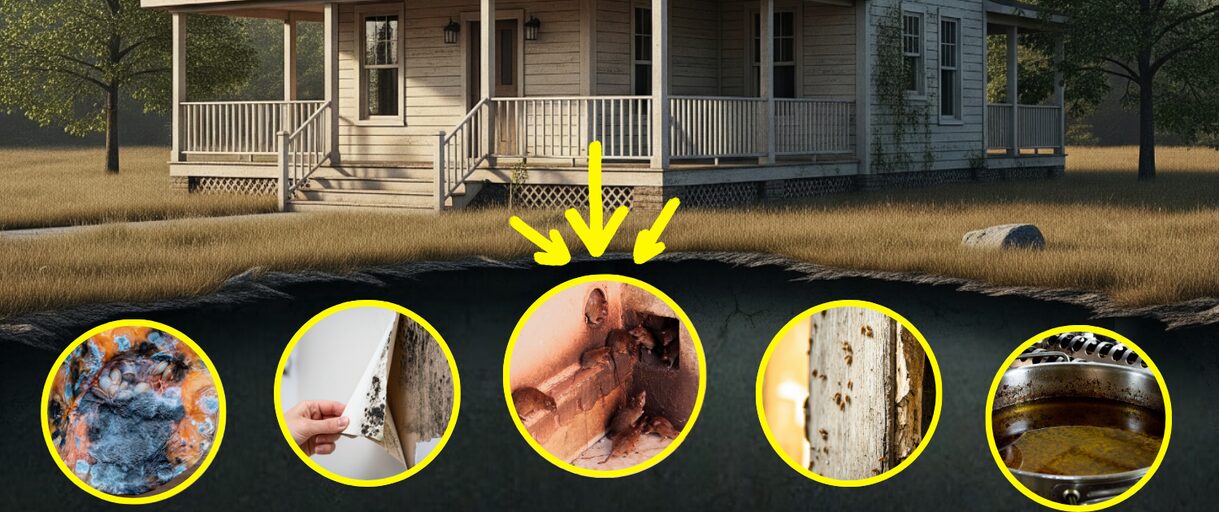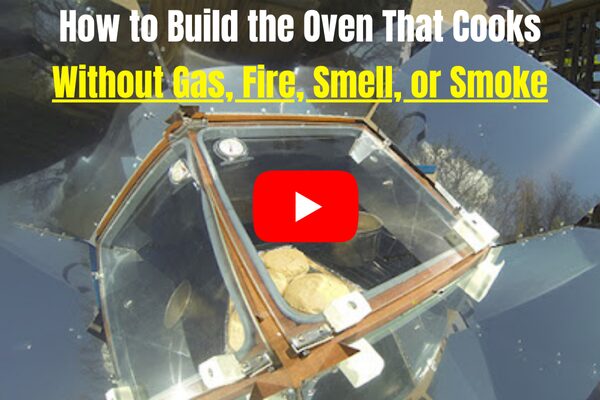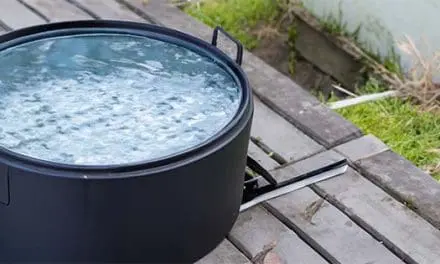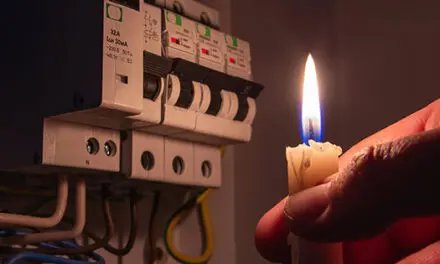At first, you might notice a faint, strange bad smell in your house. It could be slightly sweet, metallic, or even fishy—easy to ignore at first. You might open a window, blame the trash, and move on.
But some bad smells in your house are more than just unpleasant; they are warning signs.
A persistent bad smell in your house with no obvious source could indicate a serious problem. By the time the odor becomes strong and undeniable, the damage might already be happening.
If you detect a weird bad smell in your house that lingers and you can’t locate where it’s coming from, it could be your home’s way of alerting you that something is wrong.
The “Rotten Eggs” or Sulfur Smell
If your nose wrinkles at a distinct rotten egg or sulfur odor don’t just hope it goes away.
Often this smell is a red flag for a natural gas leak because utility companies add a chemical called mercaptan to gas to make it noticeable.
This oven doesn’t rely on any fuel source that could put your family at risk. No propane tanks, no gas lines, no lingering odors. It runs without fire, so there is no smoke to irritate your lungs or attract unwanted attention, and no risk of leaking gas. ⬇️⬇️
Building one isn’t complicated, either. With the right plans, you can put one together using common materials and a few basic tools. And once it’s done, you’ll have a dependable, safe and fuel-free way to cook—no matter what the grid is doing.
It could also be sewer gas escaping from a dry P-trap in a rarely used sink or an issue with your plumbing vents allowing foul odors to enter your home. On a homestead, other sources might be contributing to the bad smell in house. Your well water could be the culprit, especially if you notice the odor intensifies at certain taps or when running hot water. Sulfate-reducing bacteria in the well, hot water heater, or pressure tank can produce this persistent odor.
Sometimes, large compost piles placed too close to house vents or improperly stored animal manure can release unpleasant smells that waft inside. Even a forgotten stash of rotting potatoes or onions in the root cellar can emit foul odors. If you use propane, be sure to check your appliances for malfunctions that might cause strange smells.
To help absorb odors and improve indoor air quality, ensure proper ventilation and consider using air purifiers in enclosed spaces. Regularly cleaning areas prone to moisture with a bleach solution or soapy water can help kill bacteria and mold spores that contribute to musty smells. Taking these steps will help you get rid of lingering bad odors and maintain a fresh-smelling home environment.
Musty, Earthy, or “Old Wet Socks” Odor
When your house starts smelling like damp basement, wet cardboard, dirt, or even old gym socks, you’re likely dealing with hidden dampness and the growth of odor-causing bacteria.
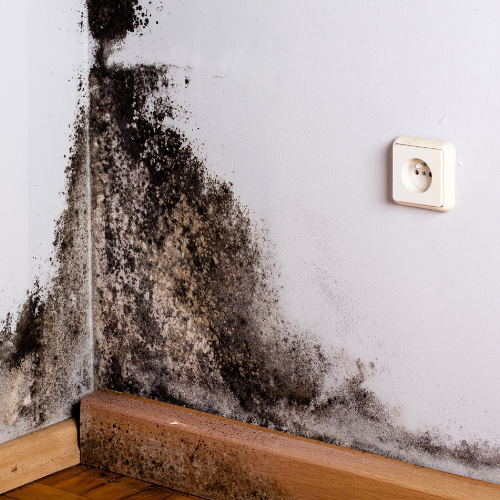
The most common culprits are mold and mildew flourishing due to unnoticed leaks, high humidity, or condensation. These conditions create an environment where odor molecules thrive, contributing to that musty smell.
On homesteads and older homes, specific spots often encourage these smells. Many farmhouses have damp crawl spaces or basements with dirt floors that wick moisture from the ground. Your root cellar, if not properly ventilated, might develop mold on stored food or the walls, adding to the earthy scent.
Leaks in outbuildings, damp sheds, or barns attached or close to your house can also allow pet dander, pet bedding, and dead skin cells to accumulate moisture and smell bad.
Ever notice a “wet dog” smell even when your furry friend is perfectly dry? Certain bacteria or molds in soggy carpets, laundry, or within your HVAC system can create that exact aroma.
To help prevent odors and keep your house smelling fresh, ensure good air circulation by opening windows regularly and using ventilation fans. Cleaning with white vinegar or baking soda solutions can help kill bacteria and absorb odors naturally without harsh chemicals.
Also, don’t forget to deep clean areas prone to moisture and wipe surfaces with soapy water to reduce mold spores and odor-causing bacteria buildup.
Fishy Smell
If a strange decaying fish odor suddenly appears in your house, your first thought might not be an electrical issue, but it’s a critical possibility.
Overheating electrical components like melting plastic insulation or wiring can give off a distinct fishy smell. While certain types of mold can also produce a similar scent ruling out an electrical problem is top priority.
On a homestead, you might encounter this if you’re running heavy-duty farm equipment or tools on undersized circuits connected to your house. These overloaded circuits can cause components to heat up dangerously.
The Amish have long known the risks of depending on complex electrical systems like these. That’s why many of their tools are powered by air or simple mechanical systems. No wires to overheat. No fire risk from failing circuits. Well-built, reliable tools that get the job done without depending on the grid.
Because if the power goes out for good or electrical systems become too dangerous to use, those who can still function without them won’t be the ones scrambling.
➡️ Air-Powered Tools That Make the Amish Self-Sufficient in a World Without Electricity
For the first time ever, this 200-year old knowledge is available in a beautifully crafted physical book, written by Eddie Swartzentruber—someone who spent the first 16 years of his life living among the Amish. Secure your own physical copy today and 3 FREE GIFTS using my personal 76% discount coupon from here.
Only 50 copies left + 3 FREE GIFTS. Secure yours today!
Another less common but possible homestead-specific cause could be certain older pest deterrents or poisons that have started to degrade or were improperly used and are now emitting odors.
Sweet, Syrupy, or Chemical Bad Smell in House
A sweet chemical smell, perhaps resembling antifreeze or a faint solvent odor, can be a serious warning sign indicating potential hazards in your home. Often, this scent points to an antifreeze (ethylene glycol) leak, which might originate from a vehicle parked in an attached garage or from certain types of HVAC systems that use antifreeze as part of their operation.
Refrigerant leaks from your cooling systems can also emit a sweetish scent, which, while less acute, can persist and contribute to unpleasant odors in your house. Additionally, formaldehyde off-gassing from new building materials, furniture, or volatile organic compounds (VOCs) released by fresh paint or adhesives can create a persistent chemical presence that affects indoor air quality.
On a homestead, consider whether improperly stored farm chemicals such as pesticides, herbicides, or fertilizers are kept near your living spaces or in poorly ventilated areas, as these can release harmful and unpleasant smells. Spills or leaks in workshops, barns, or storage sheds connected to the house could also be sources of these odors, especially if air intakes are located nearby.
Though rare, it’s important to be aware that methamphetamine production can create strong chemical or cat-urine-like smells; if you notice other concerning signs in your local area, take appropriate precautions.
To help absorb odors and improve indoor air quality, use natural odor removal methods such as placing an open box of baking soda in affected rooms or near sources of chemical smells. Essential oils can also be used to mask unpleasant smells and provide a fresh scent without harsh chemicals. Maintaining proper ventilation and air circulation by opening windows regularly and using exhaust fans is crucial to flushing out lingering odors and preventing the buildup of odor-causing bacteria.
Regular cleaning with soapy water or a bleach solution helps kill bacteria and mold spores that contribute to musty smells and persistent odors. Deep cleaning areas prone to moisture, such as basements, crawl spaces, and root cellars, will also reduce the presence of odor molecules and prevent bad smells from becoming a permanent issue.
If you suspect that chemical odors are coming from appliances or plumbing, inspect your kitchen sink, garbage disposal, and P-traps to ensure they are functioning properly and free of trapped food particles or standing water that can harbor bacteria and cause foul odors. Using ice cubes combined with baking soda and lemon slices to clean the garbage disposal can effectively knock loose food debris and absorb odors, leaving your kitchen smelling fresh.
In sum, staying vigilant about chemical and sweet smells in your home, combined with good cleaning habits and proper ventilation, will help you get rid of bad odors and maintain a safe, odor-free environment for your family.
Ammonia or Strong Urine House Smells
That sharp pungent smell of ammonia or strong animal urine is definitely one you’ll want to investigate quickly.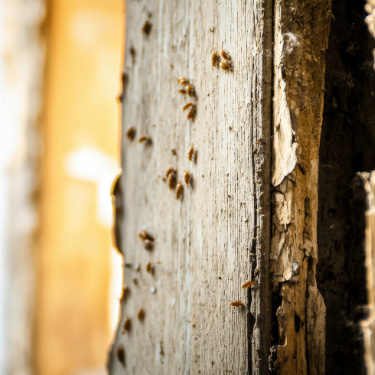
Common reasons include pet accidents that weren’t thoroughly cleaned or a growing rodent problem like mice or rats whose urine can really accumulate and cause a stink.
Some older refrigerators actually used ammonia as a refrigerant so a leak could be the culprit there.
On the homestead, you might be dealing with a larger pest infestation in your walls attic or crawlspace. Think raccoons squirrels or even bats making themselves at home. If you use a compost toilet, issues with its management or improper venting can also lead to ammonia odors.
And sometimes if your barns or coops are very close to the house prevailing winds or poor waste management can allow livestock odors to filter inside.
Burning Bad Odors (Plastic, Wood, Acrid, Metallic, or “Gunpowder/Ozone”)
Burning smells are particularly alarming and can vary quite a bit from burning plastic or wood to a sharp metallic tang or even an ozone-like scent reminiscent of a thunderstorm.
Common causes include overheating electrical wiring or appliances which often produce that plastic or metallic odor. Of course an actual fire will smell of burning wood or paper. Sometimes your HVAC system can malfunction causing dust to burn off when it first kicks on or signaling motor issues. It could also be something simple like an object left too close to a heat source.
For homesteaders malfunctioning farm or workshop equipment like welders grinders or pumps in an attached or nearby structure can send these smells into your house air. Issues with your chimney or wood stove such as creosote buildup or improper drafting can fill your home with smoke.
That gunpowder or ozone smell especially after a storm could indicate a nearby lightning strike which might have caused electrical surges or damage. Don’t overlook your well pump electronics if they’re housed in a utility area or basement as these can overheat too.
And a peculiar “burnt popcorn” smell when no one is making popcorn is often linked to failing electrical components or believe it or not large numbers of certain pests like stink bugs.
Keeping Your Homestead Air Clean and Odor-Free
Keeping nasty smells out of your homestead often comes down to regular attention and good habits. Make it a point to frequently look over your plumbing.
Pay special attention to P-traps under sinks ensuring they stay filled with water and check that plumbing vents are clear. Good ventilation is also key so ensure air can circulate well in basements crawl spaces attics and any root cellars you might have.
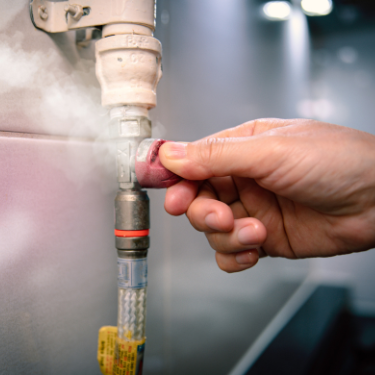
Don’t forget your HVAC system; maintain it properly and change those filters regularly to keep it breathing easy.
It’s smart to periodically inspect your electrical systems too particularly if you live in an older home or use heavy-duty equipment that puts a strain on your circuits.
Practicing good pest control and taking the time to seal up potential entry points can save you a lot of headaches and nose-aches down the road. Think carefully about how you store and manage things like compost animal waste and farm chemicals.
Keep them a good distance away from any house air intakes. Your well water system and septic tank also need regular checks and maintenance to function correctly and avoid contributing unpleasant odors.
Because if that “rotten eggs” smell is coming from your tap, it’s likely more than just an annoyance. On the homestead, this can be a sign that your well water contains hydrogen sulfide—something that not only smells awful but can also corrode your plumbing and affect your health over time.
And if that’s the case now, imagine what things might look like when the next real crisis hits.
You don’t need to run for the hills or abandon your home to keep your family safe. But you do need to make sure your water is safe and stays that way, no matter what.
The thing that will probably force most people to flee the safety of their homes is not a lack of food, but a lack of safe drinking water.
That’s why you should know things like:
- The Deadly Water Mistakes to Avoid at All Costs
- How to Stockpile a Ton of Water for 365 Days
- A Simple and Cheap Device That Can Filter Huge Quantities of Drinking Water
- Why Bleach Is Not the Best for Purifying Water (and what to use instead)
- How to Harvest Atmospheric Water
- Why You Should Place a Silver Coin in a Blue Barrel
- How to Test Your Water to See if It’s Still Safe to Drink
- How to Desalinize Water Using a Device That Costs Only $4
Plus, many other things that your life will depend on one day.
And you can find these in the Bug-In Guide book. Written by Joel Lambert, a former Navy Seal, this isn’t a mass-market manual like the cheap ones you find in libraries and online stores. Only a limited number of copies have been printed. Once they’re gone — that’s it. No reprints. No PDF knock-offs.
So, if you’re serious about protecting your electronics, your home, and your family, and having clean hot water available on your property 24/7, make sure you get your hands on this information before it’s too late. I left you a link with Joel’s personal 68% OFF discount link here for you to grab your own physical copy of The Navy Seal’s Bug-In Guide before it disappears.
Your family, your safety, and your survival depend on getting this right.
Finally always be mindful of what you’re storing in attached garages or workshops as fumes and smells from these areas can easily find their way into your living space. A little prevention goes a long way.
Staying Vigilant and Safe
Ultimately, your homestead has its own unique scent story. Most of the time, those smells are comforting and familiar signs of a productive life on the land. However, being vigilant about new and unusual odors is a key part of keeping that story a safe and healthy one. Trust your nose—it’s one of your best early warning systems.
When you detect a weird smell or persistent bad smell in your house, don’t ignore it. It could be caused by common culprits like dirty laundry or dirty clothes left damp, food particles trapped in your kitchen sink or garbage disposal, or even trash cans that need regular cleaning. These sources often contribute to kitchen smells and food odors that can linger and affect indoor air quality.
Proper odor removal involves regular cleaning routines using effective cleaning products, such as baking soda, white vinegar, or bleach solution, to kill bacteria and mold spores. Using an open box of baking soda in your refrigerator or laundry area can help absorb odors naturally. Essential oils can also be a great addition for freshening the air without harsh chemicals.
Keep in mind that volatile organic compounds emitted from new furniture or building materials can cause chemical smells, so ensure proper ventilation and air circulation in your home. If you ever notice a sewage smell or suspect a gas leak, contact your gas company immediately to ensure safety.
Dead animals hidden in walls or attics can cause persistent foul odors, so if you suspect this, it’s best to seek professional help for removal and thorough cleaning. Regularly wash pet bedding and litter boxes to prevent ammonia or urine smells, and maintain your laundry by washing sweat-soaked clothes promptly to avoid bacterial growth.
By staying attentive to these signs and maintaining good household habits, you can keep your home smelling clean, fresh, and safe for you and your family.
Do You Make These Fatal Mistakes in a Crisis? (Video)
How to Manage Serious Wounds With Household Items

